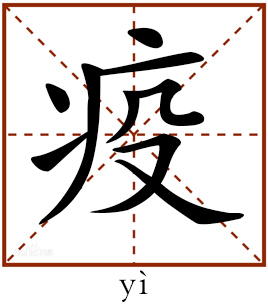Epidemic

This Chinese character refers collectively to epidemic disease, usually acute and infectious. It can also refer to plague and pestilence.
芳香辟疫
fāng xiāng bì yì
Fang xiang is a term meaning fragrance or aroma. Bi means to avoid or to eliminate. Stemming from traditional Chinese medicine, this classical allusion refers to a tradition in which ancient Chinese people cured diseases by means of aroma therapy.
Each year before and after the Dragon Boat Festival, the ancient Chinese used herbal spices such as atractylodes to fumigate their houses. The ancient Chinese believed that the Dragon Boat Festival is when pathogenic microorganisms become active, since the temperature around the festival easily breeds a variety of pathogenic microorganisms, and many kinds of infectious diseases are more likely to occur. Together with mint, xanthium, perilla and asarum, atractylodes is packaged into fragrant bags and sachets, which are either hung inside the room or worn on the body.
According to traditional Chinese medicine, the odor can pass through the mouth, nose and other orifices and enter the human body. As the scent permeates each corner of the room, the bacteria get killed, and one’s mind is refreshed and sedated. It is recorded in a medical book of the Qing Dynasty that “where there is an epidemic spreading, there are foul elements ... the prescription is to burn incense and wear herbal fragrance. Imperceptibly, the foul will abate, fade and be dispersed. The persistent illness is thus expelled.” The book prescribes Chinese medicinal herbs such as atractylodes and mugwort. Apart from them, eaglewood and sandalwood are also frequently used.
Incense burners can be found in ancient Chinese households, and it is said that Hua Tuo, the reputable physician and surgeon of the Eastern Han Dynasty, once used the burners to cure tuberculosis. Today, the role that aroma plays in sterilization is placed at a premium, and herbal incense is listed as an important hygienic disinfectant. Modern research confirms that balmy scents can promote the production of immune globulin, enhance resistance to diseases and adjust metabolism.
edited by BAI LE
